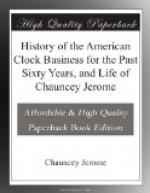CHAPTER II.
PROGRESS OF CLOCK MAKING.—IMPROVEMENTS BY ELI TERRY AND OTHERS.—SHELF CLOCK.
At the beginning of this book I have said that I would give to the public a history of the American clock business. I am now the oldest man living that has had much to do with the manufacturing of clocks, and can, I believe, give a more correct account than any other person. This great business has grown almost from nothing during my remembrance. Nearly all of the clocks used in this country are made or have been made in the small State of Connecticut, and a heavy trade in them is carried on in foreign countries. The business or manufacture of them has become so systematized of late that it has brought the prices exceedingly low, and it has long been the astonishment of the whole world how they could be made so cheap and yet be good. A gentleman called at my factory a few years ago, when I was carrying on the business, who said he lived in London, and had seen my clocks in that city, and declared that he was perfectly astonished at the price of them, and had often remarked that if he ever came to this country he would visit the factory and see for himself. After I had showed him all the different processes it required to complete a clock, he expressed himself in the strongest terms—he told me he had traveled a great deal in Europe, and had taken a great interest in all kinds of manufactures, but had never seen anything equal to this, and did not believe that there was anything made in the known world that made as much show, and at the same time was as cheap and useful as the brass clock which I was then manufacturing.
* * * * *
The man above all others in his day for the wood clock was Eli Terry. He was born in East Windsor, Conn., in April, 1772, and made a few old fashioned hang-up clocks in his native place before he was twenty-one years of age. He was a young man of great ingenuity and good native talent. He moved to the town of Plymouth, Litchfield county, in 1793, and commenced making a few of the same kind, working alone for several years. About the year 1800, he might have had a boy or one or two young men to help him. They would begin one or two dozen at a time, using no machinery, but cutting the wheels and teeth with a saw and jack-knife.




